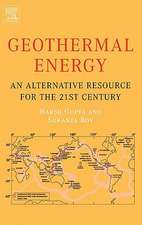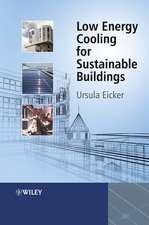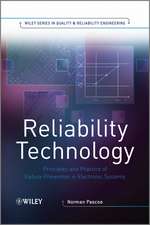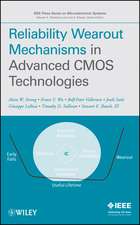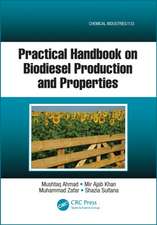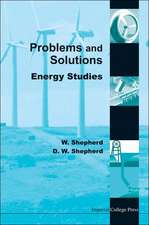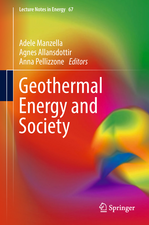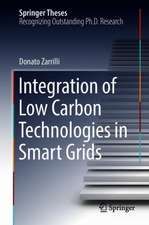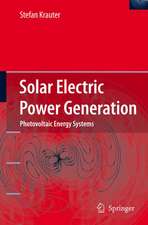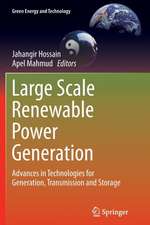Assessment and Simulation Tools for Sustainable Energy Systems: Theory and Applications: Green Energy and Technology, cartea 129
Editat de Fausto Cavallaroen Limba Engleză Paperback – 18 aug 2015
Divided across three sections, Assessment and Simulation Tools for Sustainable Energy Systems develops the reader’s ability to select suitable tools to support decision making and implementation of sustainable energy projects. The first is dedicated to the analysis of theoretical foundations and applications of multi-criteria decision making. This is followed by chapters concentrating on the theory and practice of fuzzy inference, neural nets and algorithms genetics. Finally, simulation methods such as Monte Carlo analysis, mathematical programming and others are detailed.
This comprehensive illustration of these tools and their application makes Assessment and Simulation Tools for Sustainable Energy Systems a key guide for researchers, scientists, managers, politicians and industry professionals developing the field of sustainable energy systems. It may also prompt further advancements in soft computing and simulation issues for students and researchers.
| Toate formatele și edițiile | Preț | Express |
|---|---|---|
| Paperback (1) | 952.09 lei 6-8 săpt. | |
| SPRINGER LONDON – 18 aug 2015 | 952.09 lei 6-8 săpt. | |
| Hardback (1) | 958.25 lei 6-8 săpt. | |
| SPRINGER LONDON – 20 aug 2013 | 958.25 lei 6-8 săpt. |
Din seria Green Energy and Technology
- 18%
 Preț: 891.33 lei
Preț: 891.33 lei - 17%
 Preț: 490.22 lei
Preț: 490.22 lei - 20%
 Preț: 629.52 lei
Preț: 629.52 lei - 18%
 Preț: 1394.84 lei
Preț: 1394.84 lei - 24%
 Preț: 590.58 lei
Preț: 590.58 lei - 18%
 Preț: 943.43 lei
Preț: 943.43 lei - 18%
 Preț: 789.52 lei
Preț: 789.52 lei - 18%
 Preț: 1252.44 lei
Preț: 1252.44 lei - 15%
 Preț: 655.92 lei
Preț: 655.92 lei - 18%
 Preț: 961.41 lei
Preț: 961.41 lei - 18%
 Preț: 783.20 lei
Preț: 783.20 lei -
 Preț: 307.08 lei
Preț: 307.08 lei - 18%
 Preț: 947.35 lei
Preț: 947.35 lei - 18%
 Preț: 1691.57 lei
Preț: 1691.57 lei - 18%
 Preț: 944.19 lei
Preț: 944.19 lei - 18%
 Preț: 789.52 lei
Preț: 789.52 lei - 20%
 Preț: 566.29 lei
Preț: 566.29 lei - 18%
 Preț: 952.09 lei
Preț: 952.09 lei -
 Preț: 338.49 lei
Preț: 338.49 lei - 18%
 Preț: 1114.24 lei
Preț: 1114.24 lei - 18%
 Preț: 1113.71 lei
Preț: 1113.71 lei - 18%
 Preț: 904.60 lei
Preț: 904.60 lei -
 Preț: 218.68 lei
Preț: 218.68 lei - 18%
 Preț: 890.54 lei
Preț: 890.54 lei - 24%
 Preț: 634.04 lei
Preț: 634.04 lei - 18%
 Preț: 903.93 lei
Preț: 903.93 lei - 18%
 Preț: 1117.03 lei
Preț: 1117.03 lei -
 Preț: 287.90 lei
Preț: 287.90 lei - 18%
 Preț: 957.62 lei
Preț: 957.62 lei - 18%
 Preț: 1115.46 lei
Preț: 1115.46 lei - 18%
 Preț: 997.09 lei
Preț: 997.09 lei -
 Preț: 379.39 lei
Preț: 379.39 lei - 18%
 Preț: 892.11 lei
Preț: 892.11 lei - 18%
 Preț: 949.73 lei
Preț: 949.73 lei - 15%
 Preț: 722.67 lei
Preț: 722.67 lei - 15%
 Preț: 592.61 lei
Preț: 592.61 lei - 18%
 Preț: 1124.92 lei
Preț: 1124.92 lei - 15%
 Preț: 648.24 lei
Preț: 648.24 lei - 15%
 Preț: 645.79 lei
Preț: 645.79 lei - 18%
 Preț: 1112.48 lei
Preț: 1112.48 lei - 15%
 Preț: 579.81 lei
Preț: 579.81 lei - 18%
 Preț: 1123.15 lei
Preț: 1123.15 lei - 15%
 Preț: 643.34 lei
Preț: 643.34 lei - 24%
 Preț: 1322.07 lei
Preț: 1322.07 lei - 24%
 Preț: 907.48 lei
Preț: 907.48 lei - 18%
 Preț: 952.89 lei
Preț: 952.89 lei - 18%
 Preț: 952.89 lei
Preț: 952.89 lei
Preț: 952.09 lei
Preț vechi: 1161.08 lei
-18% Nou
Puncte Express: 1428
Preț estimativ în valută:
182.27€ • 187.55$ • 153.64£
182.27€ • 187.55$ • 153.64£
Carte tipărită la comandă
Livrare economică 01-15 martie
Preluare comenzi: 021 569.72.76
Specificații
ISBN-13: 9781447157960
ISBN-10: 1447157966
Pagini: 456
Ilustrații: XXV, 427 p.
Dimensiuni: 155 x 235 x 23 mm
Greutate: 0.64 kg
Ediția:Softcover reprint of the original 1st ed. 2013
Editura: SPRINGER LONDON
Colecția Springer
Seria Green Energy and Technology
Locul publicării:London, United Kingdom
ISBN-10: 1447157966
Pagini: 456
Ilustrații: XXV, 427 p.
Dimensiuni: 155 x 235 x 23 mm
Greutate: 0.64 kg
Ediția:Softcover reprint of the original 1st ed. 2013
Editura: SPRINGER LONDON
Colecția Springer
Seria Green Energy and Technology
Locul publicării:London, United Kingdom
Cuprins
Part I.- 1.Sustainability assessment of solar technologies based on linguistic information.- 2.Photovoltaic plants selection on an insular grid using multicriteria outranking tools: application in Corsica island (France).- 3.Assessment of Green Energy Alternatives Using Fuzzy ANP.- 4.Decision Criteria for Optimal Location of Solar Plants: Photovoltaic and Thermoelectric.- 5.A Multi-Attribute Model for Wind Farm location combining Cloud and Utility Theories.- 6.Territorial Design for Matching Green Energy Supply and Energy Consumption: The Case of Turkey.- 7.A cumulative belief degree approach for prioritization of energy sources: Case of Turkey.- 8.MCDA: Measuring robustness as a tool to address strategic wind farms issues.- 9.Assessment of Energy Efficiency Technologies: Case of Heat Pump Water Heaters.- Part II.- 10.A Fuzzy Paradigm for the Sustainability Evaluation of Energy Systems.- 11.Artificial Neural Networks and Genetic Algorithms for the Modelling, Simulation and Performance Prediction of Solar Energy Systems.- 12.Artificial Neural Network based methodologies for the estimation of wind speed.- 13.The use of Genetic Algorithms to solve the allocation problems in the Life Cycle Inventory.- 14.Design and implementation of maximum power point tracking algorithm using fuzzy logic and genetic algorithm.- 15.Chapter 15 Simulation and Renewable Energy Systems.- 16.Combining Mathematical Programming and Monte Carlo simulation to deal with uncertainty in energy project portfolio selection.- 17.Value Stream Maps for Industrial Energy Efficiency.- 18.Assessment of Energy Efficiency in Lean Transformation: A Simulation Based Improvement Methodology.- 19.Socio-Effective Value of Bio-Diesel Production.
Notă biografică
Fausto Cavallaro holds an M.Sc in Environmental Management and a PhD in Technology and Economics of Processes for Safeguarding the Environment. He is associate professor of “Energy and Environmental Resources” and “Environmental Management Systems” at the University of Molise (Italy). His main fields of research are the following: renewable energy sources; technology assessment; modelling decision support system and fuzzy multicriteria analysis for renewable and conventional energy systems; life cycle assessment (LCA) and environmental management systems (EMS).
Textul de pe ultima copertă
In recent years the concept of energy has been revised and a new model based on the principle of sustainability has become more and more pervasive. The appraisal of energy technologies and projects is complex and uncertain as the related decision making has to encompass environmental, technical, economic and social factors and information sources. The scientific procedure of assessment has a vital role as it can supply the right tools to evaluate the actual situation and make realistic forecasts of the effects and outcomes of any actions undertaken. Assessment and Simulation Tools for Sustainable Energy Systems offers reviews of the main assessment and simulation methods used for effective energy assessment.
Divided across three sections, Assessment and Simulation Tools for Sustainable Energy Systems develops the reader’s ability to select suitable tools to support decision making and implementation of sustainable energy projects. The first is dedicated to the analysis of theoretical foundations and applications of multi-criteria decision making. This is followed by chapters concentrating on the theory and practice of fuzzy inference, neural nets and algorithms genetics. Finally, simulation methods such as Monte Carlo analysis, mathematical programming and others are detailed.
This comprehensive illustration of these tools and their application makes Assessment and Simulation Tools for Sustainable Energy Systems a key guide for researchers, scientists, managers, politicians and industry professionals developing the field of sustainable energy systems. It may also prompt further advancements in soft computing and simulation issues for students and researchers.
Divided across three sections, Assessment and Simulation Tools for Sustainable Energy Systems develops the reader’s ability to select suitable tools to support decision making and implementation of sustainable energy projects. The first is dedicated to the analysis of theoretical foundations and applications of multi-criteria decision making. This is followed by chapters concentrating on the theory and practice of fuzzy inference, neural nets and algorithms genetics. Finally, simulation methods such as Monte Carlo analysis, mathematical programming and others are detailed.
This comprehensive illustration of these tools and their application makes Assessment and Simulation Tools for Sustainable Energy Systems a key guide for researchers, scientists, managers, politicians and industry professionals developing the field of sustainable energy systems. It may also prompt further advancements in soft computing and simulation issues for students and researchers.
Caracteristici
Collects original contributions from various researchers to provide a review of the main assessment tools/methods/approaches connected to sustainable energy Covers both methods and applications of multi-criteria, fuzzy-sets, algorithm genetics and neural nets (artificial intelligence) and simulations using Monte Carlo analysis, linear programming (LP) and others approaches for energy systems Guides the reader to the main tools used for the assessment and simulation procedure task in the energy sector Includes supplementary material: sn.pub/extras


